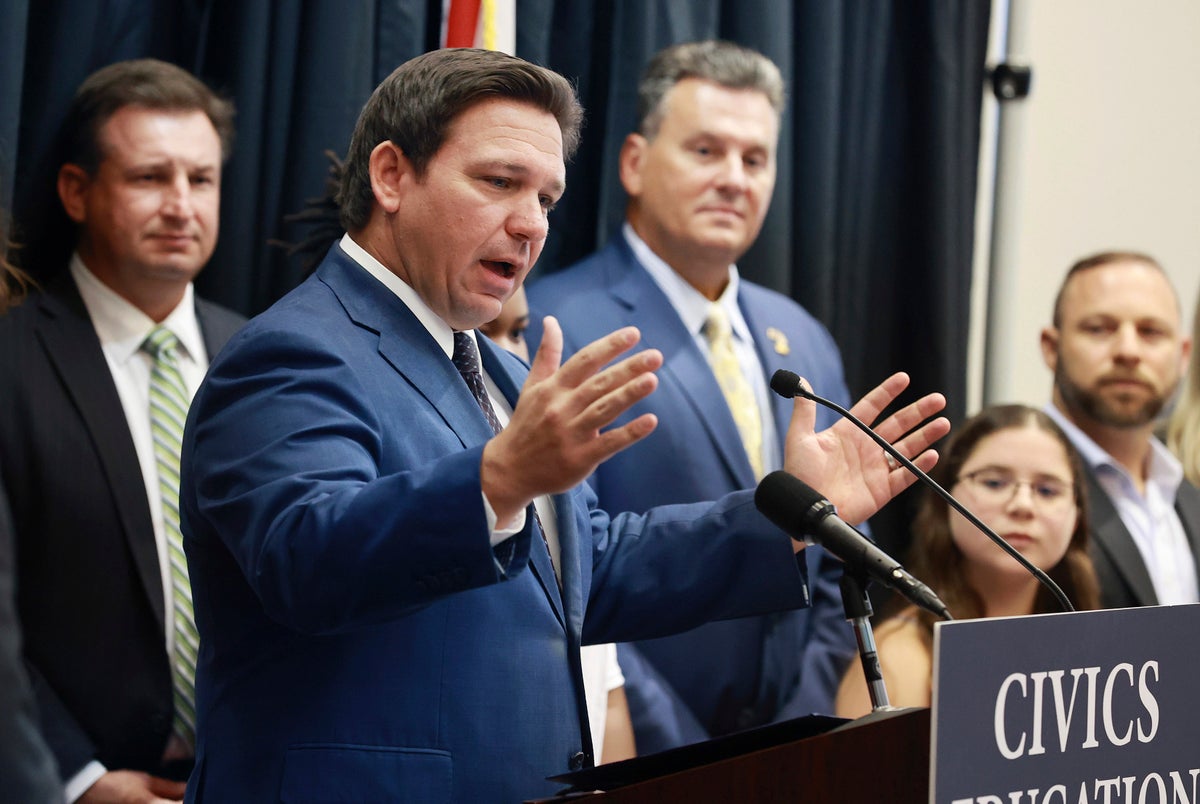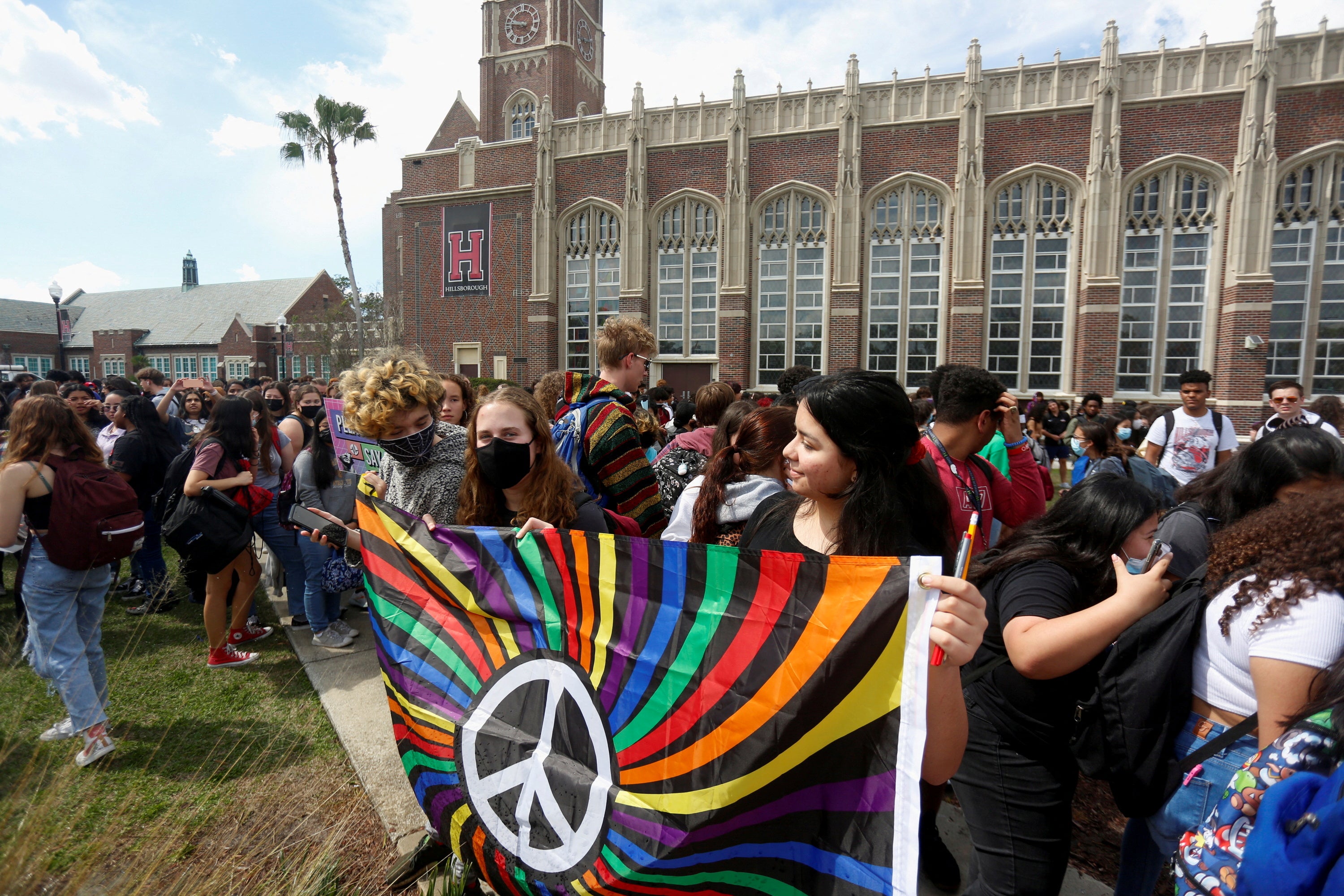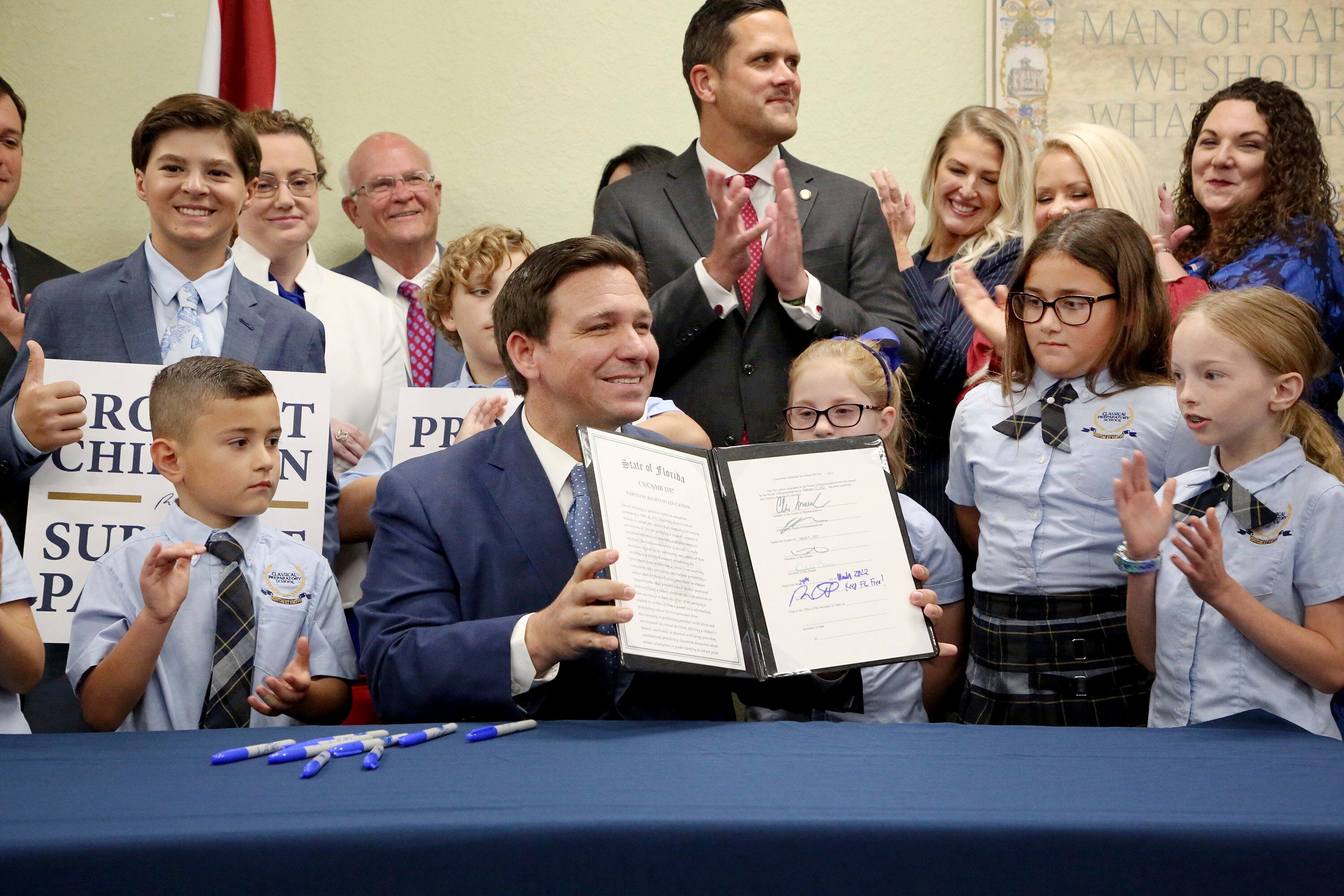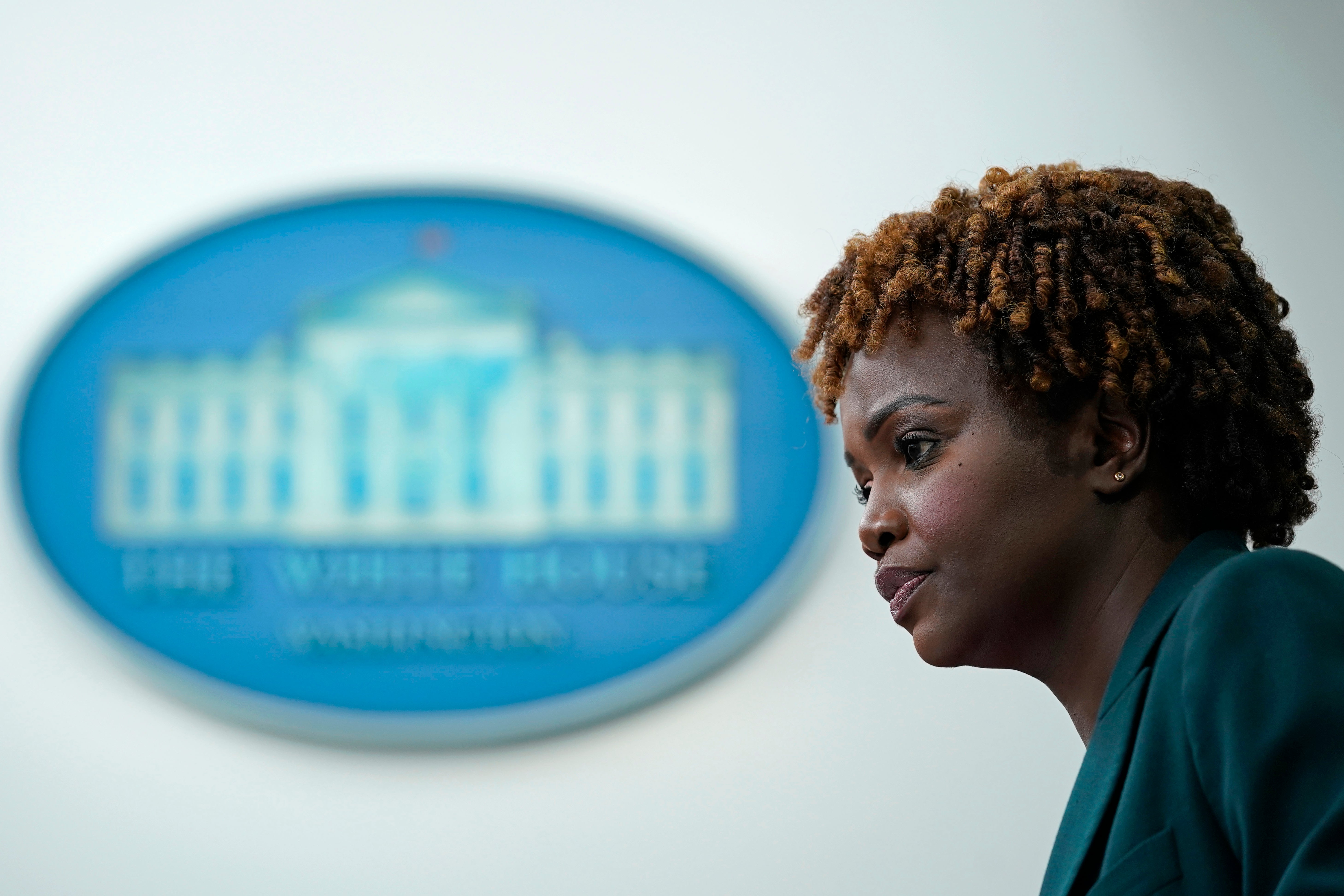
Schools in Leon County, Florida, must now notify parents if their child has a gym class with a “student who is open about their gender identity”. The schools must also notify parents if their child is attending an overnight field trip with a “student who is open about their gender identity”.
On the last day of the 2021-2022 school year, teachers in Palm Beach County were asked to comb through materials to look for books that discuss white supremacy or systemic racism or any book that “explicitly instructs” issues related to gender identity or sexual orientation.
In Orange County, a district that encompasses more than 200,000 students in an area that includes Orlando, teachers have accused school officials of prohibiting them from wearing rainbow clothing, and instructing them to remove photographs of their same-sex spouses as well as “safe space” stickers from their classrooms.
Florida’s Parental Rights in Education Act, which opponents have called the “Don’t Say Gay” law, goes into effect on 1 July, along with another measure that Governor Ron DeSantis said will block the “far-left woke agenda” from “[taking] over our schools and workplaces”.
They join parallel efforts from the state government and right-wing activist groups that could radically shape how students learn about history and social studies, replacing honest instruction on race, gender and civil rights with disputed materials and rhetoric that opponents have linked to the American right’s broader campaign to undermine public schools.
This week, Florida’s Education Department held a guidance workshop to lay out how the state’s Parental Rights law will be implemented.
A filing from the state related to a federal lawsuit trying to block the law revealed the most extensive guidance yet about how the law could be enforced, largely dismissing claims from opponents that the law could be used to target student-led LGBT+ advocacy groups, gay teachers, or questions or comments from students about themselves or their families, and limiting its reach to a narrow reading of the law.
Andrew Spar, president of the Florida Education Association teachers union, said he’s advising members to continue working as normal.
“We don’t teach sex education in grades K through three. Why did they need a law to say we shouldn’t teach sex education in grades K through three?” he told Florida’s WTSP. “What does it mean when it says age-appropriate or developmentally appropriate curriculum? What curriculum are they talking about in our upper grades? … What does it do for students who identify as part of the LGBTQ community and want additional support services in their schools?”
‘Propagandize’
The law prohibits classroom instruction on sexual orientation or gender identity in kindergarten through third grade, as well as in other grades when it’s not deemed age or developmentally appropriate. Parents can sue school districts over perceived violations.
LGBT+ advocates and legal analysts have repeatedly warned that the broadly written law could have far-reaching impacts, opening teachers and schools to spurious lawsuits that could not only chill classroom speech among LGBT+ students and teachers but erase LGBT+ people and history from lessons in all grades.
Another law – the Individual Freedom Act or Stop WOKE Act, also effective on 1 July – limits how systemic racism and white supremacism can be explained in schools as well as employer training and human resources initiatives, following a national panic over “critical race theory” seeping into elementary classrooms.

Materials obtained by the Miami Herald and interviews with teachers reveal how a state-funded programme that instructs high school teachers how to approach civics lessons includes historically inaccurate and conservative Christian readings of American history.
The training programme under Governor Ron DeSantis’s Civics Literacy Excellence Initiative underscores the tension building around a nationwide, politically volatile battle over public schools and its influence in Florida’s Republican-dominated legislature.
Slides from the programme claim that the nation’s founders did not seek the separation of church and state, downplay the role of slavery in the nation’s founding and promote an originalist interpretation of the US Constitution central to conservative idealogy.
One slide highlights three US Supreme Court cases as evidence of the founders’ “original intent [beginning] to change”, including a landmark 1962 decision that ruled that school-sponsored prayer violates the First Amendment. At one point in the session, according to teachers present, the state trainers equated that decision to the “separate but equal” ruling in 1896’s Plessy v Ferguson that upheld racial segregation (and was later ruled unconstitutional).
Another slide claimed that the “Founders expected religion to be promoted because they believed it to be essential to civic virtue”; another claimed that without virtue, citizens become “licentious” and vulnerable to tyranny.
“It is disturbing,” one high school social studies teacher who attended the sessions told the newspaper. “There is this attempt to both censor and to drive or propagandize particular points of view.” Another teacher condemned the state’s “false narrative that we’re indoctrinating children, but that is nothing compared to what the state just threw in new civic educators’ faces”.
“That’s straight-up indoctrination,” he said.
The three-day sessions are voluntary, but teachers are provided a $700 stipend and are eligible for a $3,000 bonus if they complete an accompanying 60-hour online course.
The workshops, part of a roughly $6m state-funded programme, were built with support from the Bill of Rights Institute, founded by Charles Koch, as well as Hillsdale College, a politically powerful, private Christian conservative university in Michigan. In a recently uncovered video, the university’s president Larry Arnn claims teachers are taught “in the dumbest parts of the dumbest colleges in the country” and that “the philosophic understanding at the heart of modern education is enslavement”.
“They’re messing with people’s children, and they feel entitled to do anything to them,” he says in a video to Tennessee Governor Bill Lee, who, throughout the remarks, does not take issue with them or defend the state’s 80,000 public school teachers.
“Here’s a key thing that we’re going to try to do,” Mr Arnn says. “We are going to try to demonstrate that you don’t have to be an expert to educate a child because basically anybody can do it.”
The Independent has requested comment and additional information about the conference materials and how they were developed from the state’s Education Department.
The ‘astroturf’ campaign behind ‘parental rights’
Meanwhile, activist groups backed by similarly powerful right-wing lobbyists and well-financed special interests have partnered with right-wing and anti-LGBT+ publishers to replace library materials with their own materials.
Moms for Liberty, a Florida-based group that has mobilised across the US, with 195 chapters in 37 states, followed a wave of “parents rights” groups that formed over Covid-19 frustrations that run parallel to “astroturf” campaigns against critical race theory and LGBT+ people in schools. One of the architects, Christopher Rufo, a fellow at the conservative Manhattan Institute think tank, has been transparent about a strategy to conflate “cultural insanities” under the umbrella of critical race theory.

Those fears are amplified by a large network of well-funded and well-connected groups, including those supported by former Trump administration-era officials, Republican mega-donors and the Heritage Foundation-linked Heritage Action, among others, with connections to right-wing media personalities and publishers, all with dedicated, years-long interests in dismantling public schools.
Moms for Liberty has vociferously opposed “critical race theory”, a collection of legal and post-graduate scholarship about the systemic influence of racism in American institutions that has served as a catch-all term for honest lessons or books on civil rights history and enslavement, along with allegations that teachers and textbooks are under its influence.
The group’s chapters have led censorship campaigns in schools and libraries, including listing titles such as Martin Luther King Jr and the March to Washington and Ruby Bridges Goes To School as “books of concern”.
Earlier this year, the group announced its partnership with BRAVE Books, which has faced widespread criticism for its anti-transgender picture book Elephants Are Not Birds.
BRAVE pledged a donation of 1,500 books that Moms for Liberty’s Moms for Libraries campaign plans to donate to elementary school libraries, according to the group. Ben Carson’s American Cornerstone Institute also pledged to donate copies of his Christian children’s book Why America Matters.
“In every school library, there should be books like BRAVE’s that promote our unifying and empowering American values, which should not be second place to any other point of view. BRAVE Books is an excellent partner for this project, as their books help children explore current issues from a different perspective,” the group’s Orange County chapter chair Catherine Rahimian said in a statement in January.
Trent Talbot, the publisher’s CEO, said he hopes the “donation and partnership helps them build momentum, because what they do is so important.”
Larry Kudlow, a former Trump administration official and Fox News personality, has praised BRAVE for taking a “stand against ‘wokeism’” and the “left’s crazy woke influence on American kids.”
It is unclear whether any libraries have accepted their donations or whether schools are using those materials in their curriculum.
GOP officials are driving ‘book bans’ and library censorship, but they are largely unpopular with voters
A recent report from the American Library Association found 729 attempts to remove school materials last year, leading to roughly 1,600 book challenges and removals, the highest ever since the group began tracking the efforts two decades ago.
A report from PEN America found more than 1,100 titles were banned or investigated in 86 school districts in 26 states from July 2021 to March 2022, impacting more than 2 million students.
Despite those efforts, legislation to remove books from libraries is deeply unpopular, except among Republican legislators.
A vast majority of voters – 71 per cent – oppose efforts to remove books from public libraries, a figure that stays largely the same across all political parties, including 75 per cent of Democratic voters and 70 per cent of Republican voters, according to a March poll from the American Library Association.
Eighty-four per cent of parents with public school students who participated in the poll also believe that materials at the centre of the critical race theory panic, like The New York Times’ 1619 Project, the Pulitzer Prize-winning effort to place the stories of enslaved people in telling the nation’s history, should be available in their childrens’ libraries.
Parents also support the inclusion of books targeted across the US for LGBT+ content, such as George and This Day In June (65 per cent) or scenes with sexual violence, such as Toni Morrison’s Beloved (57 per cent).
Ninety-two per cent of all respondents, including 91 per cent of Republicans, said they believe school libraries play an important role in communities and schools, and 74 per cent are confident in their public school libraries’ decisions about their collections, according to the survey.
The influence and dominance of right-wing activism – invoking the rhetoric of parental rights to channel moral panic – has alarmed opponents and teachers who could now face both the arm of the law and abuse from “grassroots” campaigns enforcing it.
‘End public education as we know it’
Teachers face a “smear campaign” to “undermine the work that we’re trying to do to help kids recover” following the devastating Covid-19 pandemic that has upended school life, according to Randi Weingarten, president of the American Federation of Teachers, which represents roughly 1.7 million members.
“It’s intended to create distrust,” she told The Independent. “What we should be doing is doing what kids need, and what kids need is a real focus on literacy and reading, on critical thinking, on career and college pathways to their future, [and] safe and welcoming environments in schools.”
Within the last two academic years, at least 160 teachers were fired or forced to resign from their jobs following debates over “racial, political or pandemic issues [that] intersected with their ability to teach,” whether they were trying to navigate controversial topics in the classroom or because administrators sought to punish them for their views, according to an analysis from The Washington Post.
“This has been the hardest year ever, for parents, for kids, for educators, and these right-wing extremist groups are just making it worse,” Ms Weingarten said. “We’re trying to create a welcoming and safe environment for kids, and I think that if Fox News wasn’t around, and you didn’t have this kind of push by the extremist forces in the right wing to end public education as we know it, and to try to maintain the fear and anxiety that so many parents have had, because of Covid, it would be clear to everyone how much parents and teachers have much more in common than not.”
The US Supreme Court’s decision to strike down constitutional protections for abortion care has also opened the door for conservative legal challenges to repeal decades of social progress and civil rights, including public schooling, according to advocates and legal analysts.
Texas Governor Greg Abbott said he would “resurrect” the decision in Plyler v Doe, which effectively affirmed the right of all children to public education by striking down a Texas law that denied funding to schools with undocumented immigrant students.

In the case of Kennedy v Bremerton School District, the court ruled that a school board in Washington state violated a football coach’s constitutional rights by not renewing his contract after he ignored school officials’ command to stop kneeling in prayer on the field’s 50-yard line after games. In their dissent, the court’s liberal justices warned that the court’s conservative majority “sets us further down a perilous path in forcing states to entangle themselves with religion, with all of our rights hanging in the balance.”
In another school-related case a week earlier, Justice Sonia Sotomayor said the court “continues to dismantle the wall of separation between church and state”.
Similar laws are playing out across the US
In 2022, at least 35 other states enacted or proposed legislation to outlaw or restrict lessons on “critical race theory”, while five other states have enacted laws that echo Florida’s “Don’t Say Gay” measure. More than two dozen other bills were proposed, according to the Human Rights Campaign and the Movement Advancement Project.
Joni Madison, interim president of the Human Rights Campaign, called implentation of the Florida’s “Don’t Say Gay” law a “shameful attack on students already struggling with the weight of discrimination.”
Two-thirds of LGBT+ youth reported negative mental health impacts around such legislation, according to a report from LGBT+ advocacy and crisis intervention group The Trevor Project.
A 2021 report from the organisation found LGBT+ youth are four times more likely to seriously consider, plan or attempt suicide than their peers, while LGBT+ young people between the ages of 13 and 24 attempt to kill themselves every 45 seconds within the US.
“It is a slapdash, mean-spirited, impossible-to-comply-with law designed to make LGBTQ+ students feel shame and isolation at school, a place where every child deserves a chance to learn and succeed,” Ms Madison said in a statement.
On 1 July, White House press secretary Karine Jean-Pierre called the law “discrimination, plain and simple.”
“It’s part of a disturbing and dangerous nationwide trend of right-wing politicians cynically targeting LGBTQI+ students, educators, and individuals to score political points,” she said in a statement. “It encourages bullying and threatens students’ mental health, physical safety, and well-being. It censors dedicated teachers and educators who want to do the right thing and support their students. And it must stop.”
Ms Weingarten told The Independent that the laws are “intended to censor, and to stifle and to chill speech and to make teachers think twice before they answer a question … and freeze the kind of critical thinking that is supposed to happen in schools.”
“They’re intended to get into teachers’ minds, get teachers wondering, ‘Should I answer that question? Can I answer that question?’ It’s intended to thwart knowledge,” he said. “Can we actually teach about the mass shooting that happened in Buffalo? ... Because it is clearly an example of white supremacy. And we can’t use the words white supremacy.”







